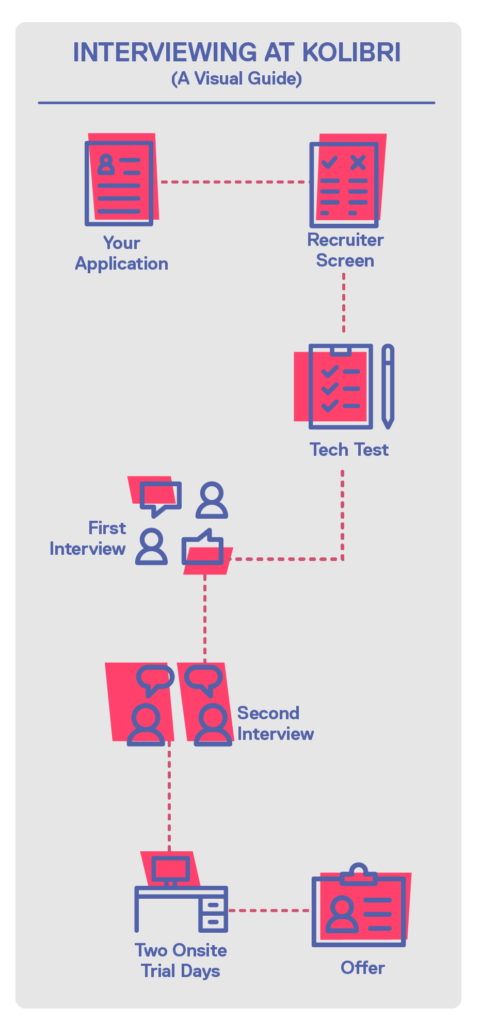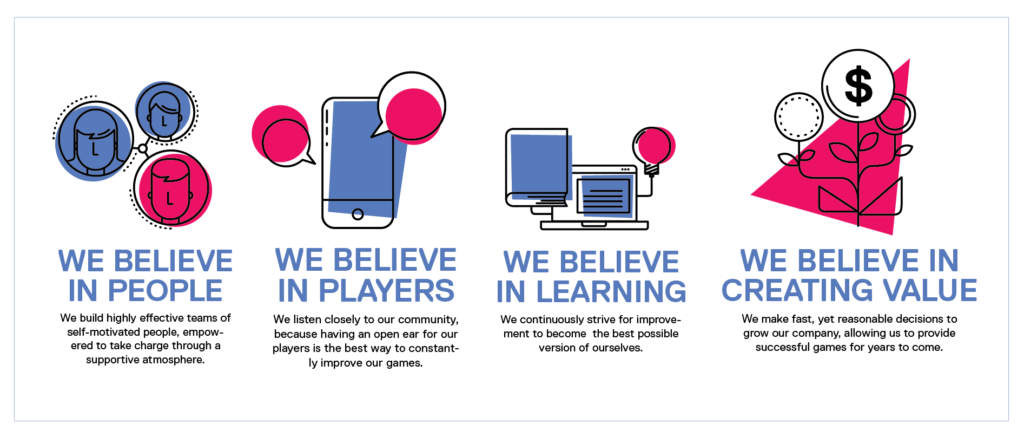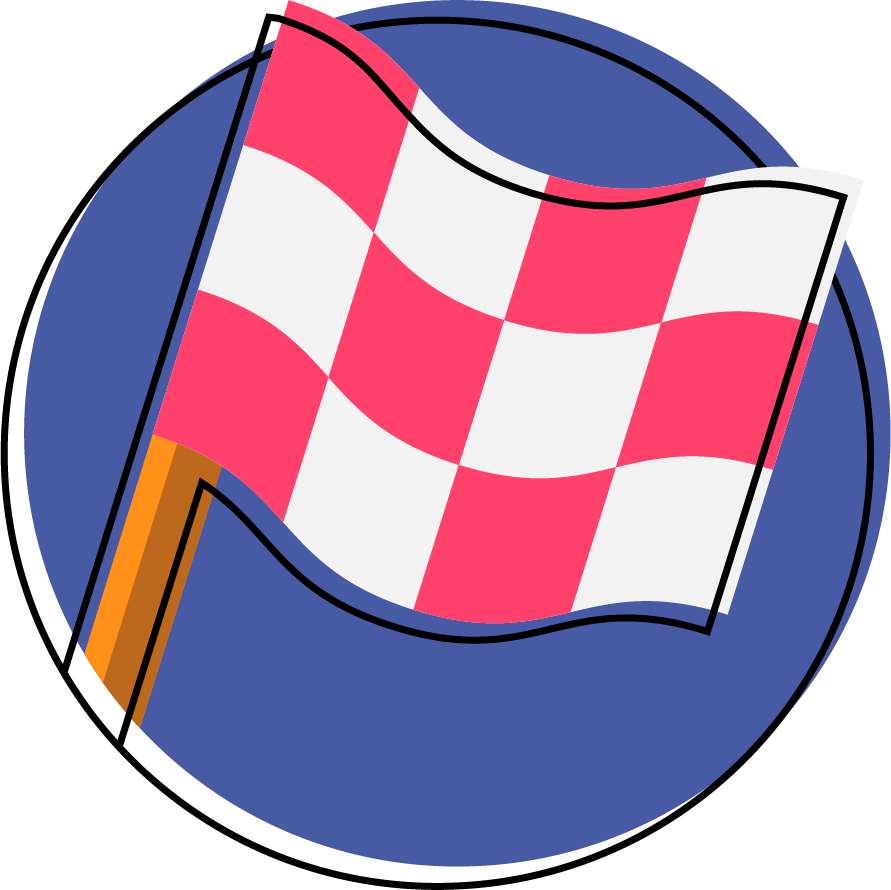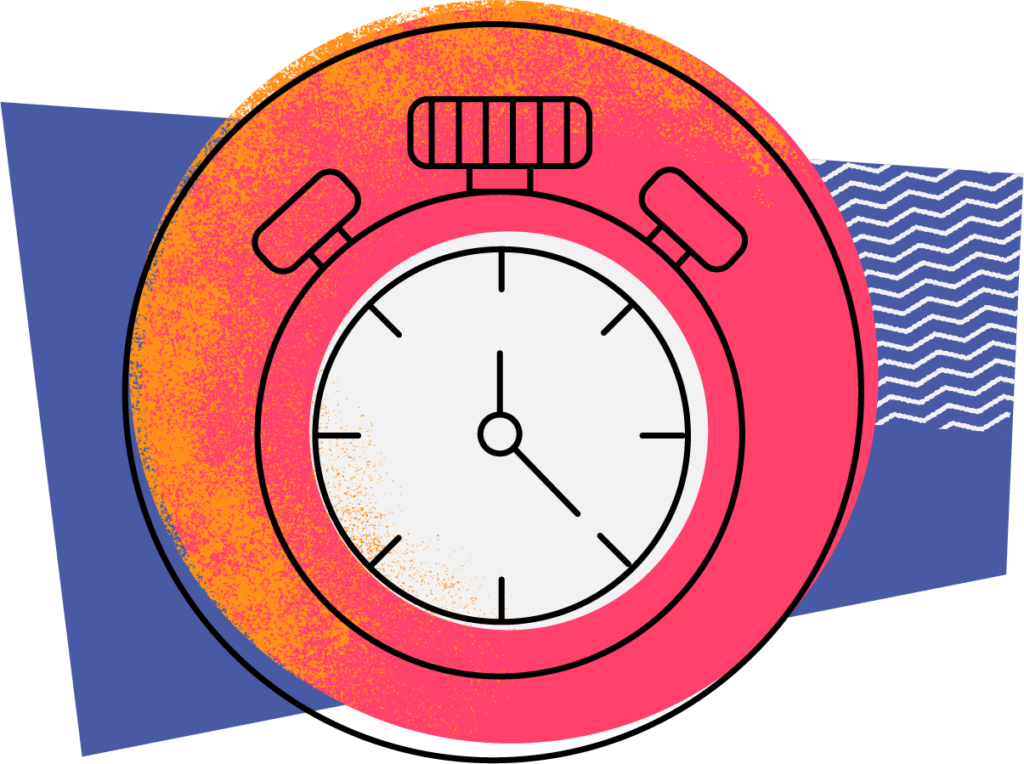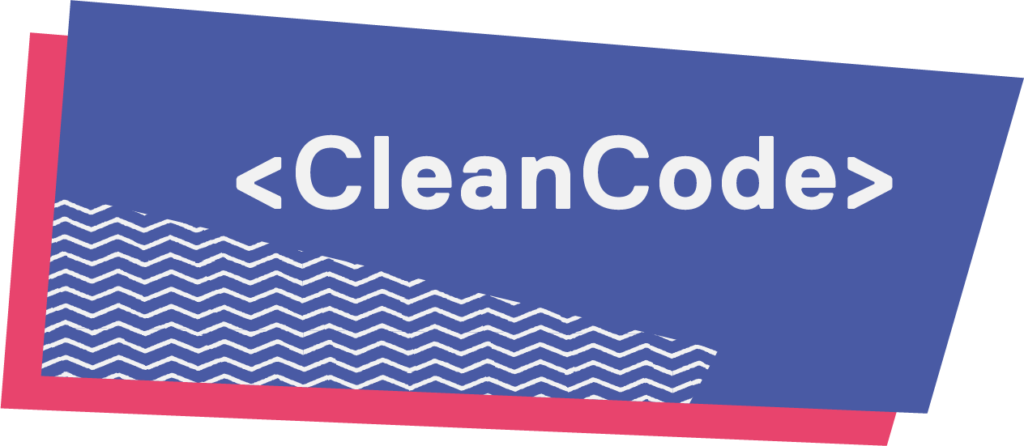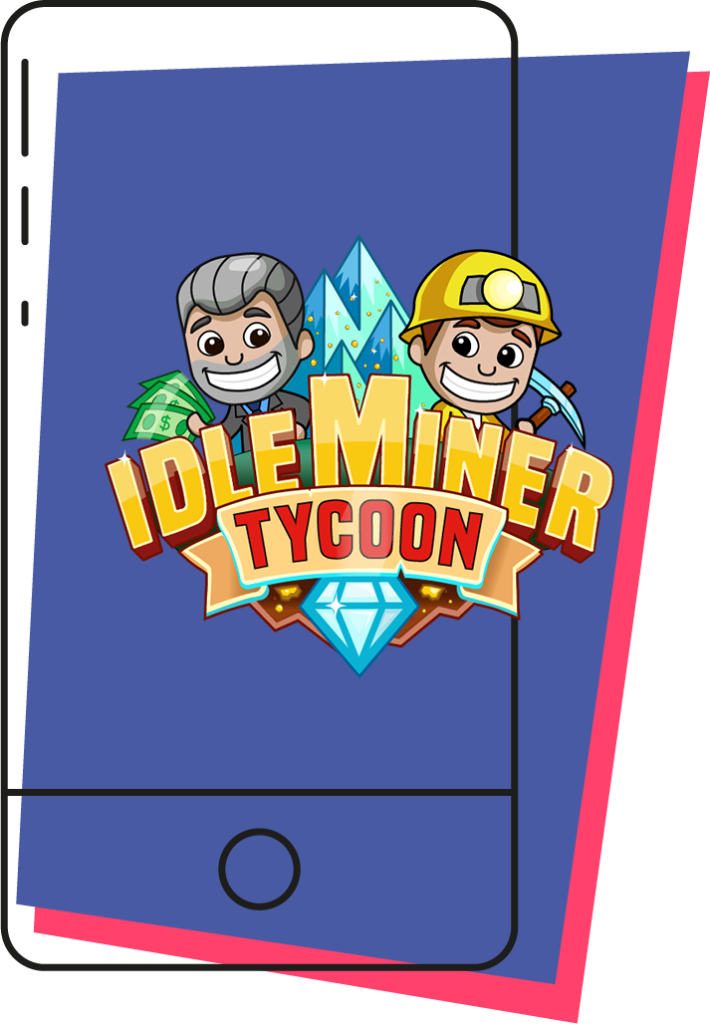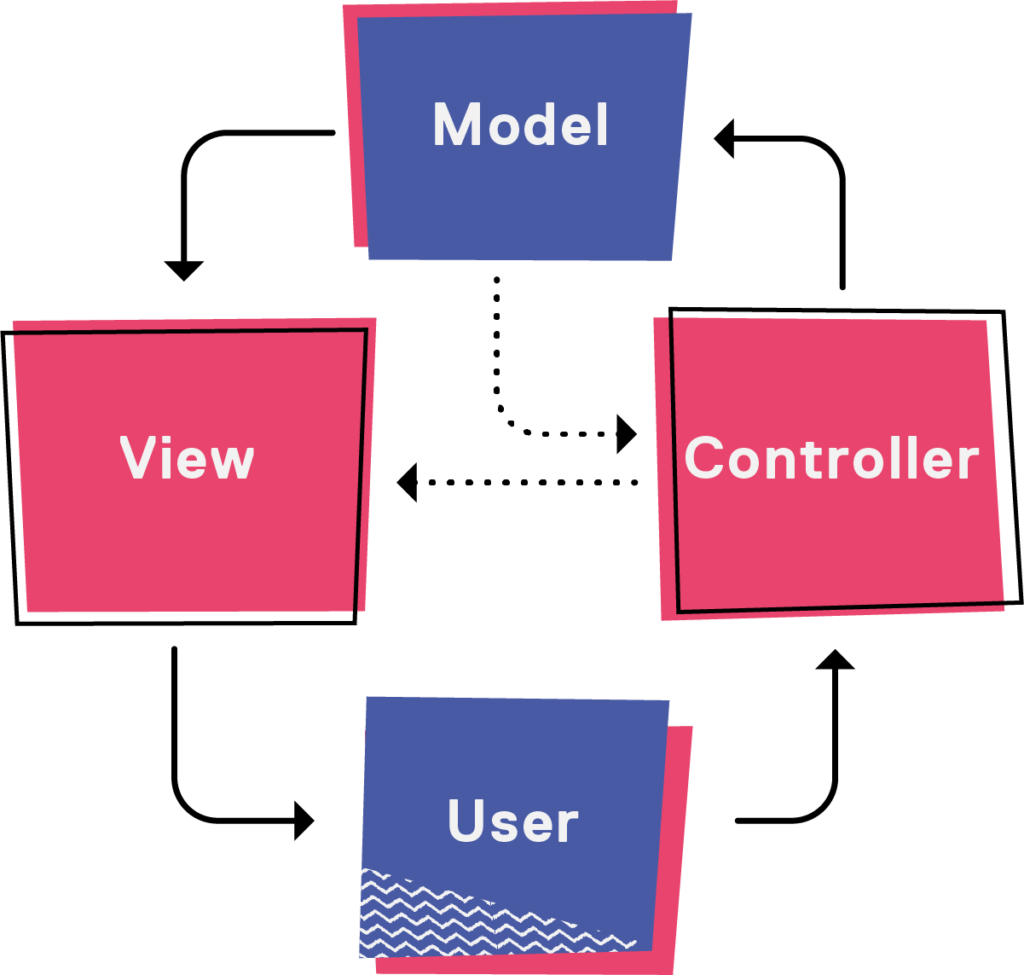After looking at how to get a job as an artist at Kolibri Games, let’s turn our attention to the developers. They are some of the people that, literally, make our games work. We need a lot of developers here. Looking at just one of our games teams for example, out of 14 team members, five are developers, making them the plurality. Next up are the artists, with three team members. On one of our smaller, new-games teams, three out of five Kolibris are developers, rounded out with one artist and a product manager.
Simply put, developers are key to turning our ideas into games.
The hiring steps for a technical position are slightly different than for some of our other roles.
You’ll do a first call with our HR department. This is a general interview to assess where you are in your career, your general suitability for the role and just to get to know each other. No matter what role we’re filling, we’re hiring a person, not a resume – and the converse is just as important. No matter what job you end in, it’s with a group of people, not with a faceless company.
From there you’ll be asked to take a tech test. We host our tests on HackerRank. It’ll take around two hours and we’ll only advance you if you’ve scored high enough – so it matters. Luckily, and you should not be shy about taking advantage of it, you can take a practice test first. Seriously, take it. There’s no downside and it’ll only help you out when you send your final test to us. Without giving away too many spoilers, you may want to brush up on your class architecture and diagramming for the test.
The tech test allows us to shortlist around half of all our applicants. The next step is a Zoom call with one of our hiring managers, usually a senior Unity developer on Idle Miner Tycoon or one of our newer games teams. This is a chance to talk about your tech test, and for you to learn a little more about how we work. At Kolibri Games, both our live and new games teams are growing and every team has its own personality. This is a great opportunity for you to ask all the questions you have about how they work, how they fit into the whole company and about how you might fit in.
And there’s still one more interview before we offer our trial days. You’ll get a one-on-one with our Senior Engineering Manager who is responsible for hiring for all of our teams and the professional development of our engineers. In this interview, you might talk about C#, but you’ll also be talking about yourself, your work style, and what you’re looking for in an employer.
We have four core values at Kolibri Games.
They’re all related and they all build upon each other.
As we start to get to you know, we’re particularly interested in the learning trajectory that brought you here. What are some of the key learnings that have shaped you? Did they come through school, side projects or professional work? With those under your belt, where do you want to go next? We’re committed to helping all our employees grow their knowledge and skillsets. Obviously, we’re going to prioritise learning that helps us serve our players and therefore creates value for both them and us, but we want to get to know all of your interests because well-rounded, curious people make the most interesting, compelling games.
Hopefully what this is articulating is that beyond coding skills, we value a strong company fit. We don’t crunch and do 80-hour weeks, but we do work hard and in order to reach our goals, we’ve got to be a good fit with one another.
Trial Days
Assuming things go well, it’s time for your trial tasks. Here’s an older blog post that provides an overview of how they work. For developers, we’ll have you working on an Idle Miner Tycoon-related task, whether we’re hiring for IMT or one of our other games. This task is representative of the kind of work you’d do on one of our teams, but isn’t something that’s actually going into our games. If you want to ace your trial days, here are a couple of things to keep in mind:
Ask questions.
During a normal workday, you’ll talk to your fellow Kolibris all day long. Get into that habit on your trial days. No one would prefer you spend two hours solving a minor problem that derails your larger trial task when one of us could have cleared it up in 5 minutes. These kinds of questions, instead of making you look inexperienced, show that you know how to prioritize your tasks.
In our experience, junior developers tend to ask fewer questions than more experienced developers.
Don’t try to impress. Try to finish the job.
Because we’re a Games as a Service company, we move quickly, we ship often and we don’t always have time to be “perfect”. Keep the 80/20 rule in mind and when thinking about how to complete your trial task, aim for the 80% solution within the allotted time. When you hit that goal and have more time, by all means, polish it to perfection – but make sure there is something to polish.
Take time to plan
Related to the above, don’t just jump into Emacs and start cranking. Trust us, we know it’s hard. On your trial day, you’re joining us in our sprint planning kickoff. You’ll have a couple of scheduled “coffee breaks” to socialize, and you’ll eat lunch with a few Kolibris (over Zoom while we’re still working remotely). It’s easy to feel like your day is full before you’ve written a single line of code. This, however, is the best reason to hold off a bit longer, take a breath, and plan how you’re going to use your time.
Learn to like Clean Code
If there’s one book every Kolibri developer reads, it’s this one. If you want to write code that’s easily readable, maintainable and extensible – all important concepts in a live game environment – this book is your go-to resource.
Play Idle Miner Tycoon
Maybe this one’s a no-brainer, but it’s worth mentioning nevertheless. You may not be testing for a role on the IMT team but it’s our game with the largest and most mature codebase. All of our developers have worked on it at some point and it’ll serve you well to know how it operates.
Know your Model from your View from your Controller
UI is important in our games, as in lots of simulation-based games. Players can interact in a variety of different ways and affect multiple variables. How this is implemented is significant for how the game is built. Be familiar with Model-View-Controller architecture and reactive programming and remember how we mentioned class architecture and diagramming already? There may be a pattern here…
We Can’t Wait to Meet You
While we don’t want to give away too much, what we hope you’ll take away from this is that we want you to succeed. By the time you’re on your first trial day, we’ve invested time in getting to know you and you’ve taken the time to get to know us. The best-case scenario is that you ace your trial tasks and we start working together as soon as possible. We won’t give you a trial task that you can’t complete or leave you without the resources you need. Take every advantage of them that you can.
Now you know all about us, let us get to know you! Check out our current openings below and on our careers page and get in touch. We’re looking forward to working with you.
